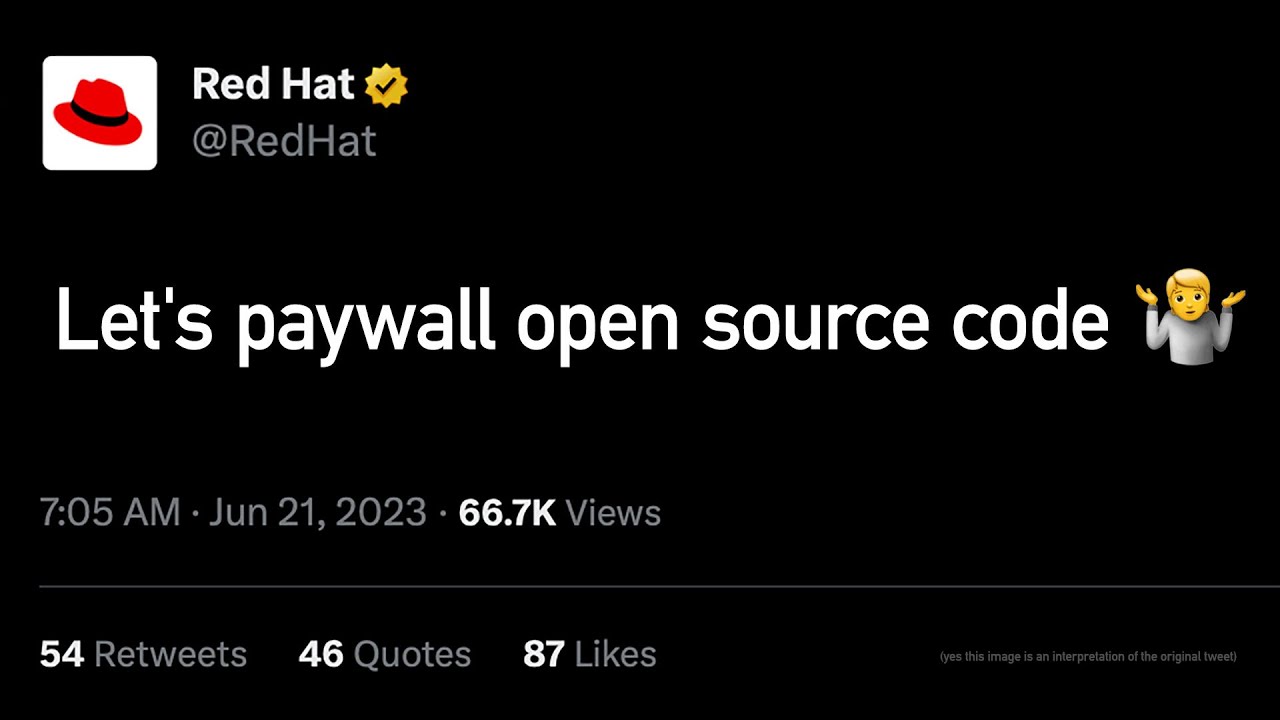An exceptionally well explained rant that I find myself in total agreement with.
Guess they really wanted to be the Reddit of Linux
Reddit Enterprise Linux
I’m so annoyed with this. We were using CentOS, which was effectively killed, then I did a lot of research and spent time moving everything over the AlmaLinux.
Having to now do it all again another time is so frustrating; the only pragmatic long-term option is to bite the bullet and get things working on Debian.
Look in to Rocky Linux. It was started by the original developer of CentOS the day Red Hat announced that CentOS would be moving upstream of RHEL. They’ve already put out an announcement saying that it’s essentially going to be business as usual for them.
Thanks tool.
From what I understand, Rocky and Alma are essentially the same and so I found it difficult to decide between the two when moving from CentOS. Whatever happens now, will apply to both.
The writing is on the wall and it’s similar to Twitter and Reddit: they wanted to kill CentOS as it was, weren’t expecting the community to come back with Rocky and Alma, so now they’re trying to kill those too. The above video posits a scenario where Oracle’s legal team help the little guys by going to battle with IBM, but I don’t see it.
At this point, I don’t think it’s smart to go to the Winchester, have a nice cold pint, and wait for this all to blow over, but then again I’d be very happy to see the little guys succeed.
Truly the year of enshittification.
This was his first reaction, just as satisfying to read: https://www.jeffgeerling.com/blog/2023/dear-red-hat-are-you-dumb
Wait, I only knew this name from good Ansible stuff. I had no idea he created great videos too!
I’ve been watching ol Jeff for quite some time. He’s so delightfully nerdy I love him
Jeff is 100 spot on. IBM/Redhat is really shooting themselves in the foot for some short term profits.
This said it all perfectly. Think I’ll check out more of his videos.
If you like raspberry pis, SBCs, or Linux you’re in for a decent time. Although he did get a bit of flack for his Eben Upton interview. Though I felta lot of that was overblown.
I can’t believe how many people fundamentally misunderstand the spirit behind the GPL.
It helps to consider “the software” as a single snapshot in time, with the GPL’s intention that the consumer may make their own fixes, rebuild, and redistribute. Check.
Remember: “Free as in freedom, not free as in beer.” Selling open source software has always been explicitly allowed, as long as you make the source available to those who receive it. Check.
What the GPL does NOT provide is guaranteed access to maintenance and future versions of said software. Again, it applies to a snapshot, as delivered.
In a nutshell, the customer receives open source everything they FOR A PARTICULAR VERSION.
I see no problem — either in spirit or letter — in Redhat’s approach here.
The GPL requires that you do not put additional limits on a user’s rights to redistribute.
Saying “you have the right, but we’ll cut ties” isn’t really in keeping with the spirit of that.
I suspect, if it ever ended up in court, they’d agree yhat there’s no guarantee of access to future versions, but that doesn’t mean that it isn’t a shitty and cynical take that flies against what FOSS has traditionally stood for.
We can agree to disagree. “The Software” was delivered, source included. And you as end consumer are free to redistribute and maintain as you wish.
However, I cannot see any contract law judgement that would force continuation of a subscription model on the vendor (in perpetuity!) if they do not wish to remain under contract.
The problem is that the GPL states:
You may not impose any further restrictions on the recipients’ exercise of the rights granted herein.
Red Hat are arguing that they are free to punish customers from exercising their rights under the GPL, and that punishment does not constitute a “restriction”, even though its done specifically to discourage people from exercising those rights. Whether Red Hat have found a loophole is something for the courts to decide, but it’s clearly against the intention and spirit of the GPL.
That’s a fair point, and worthy of deliberation.
However, I would continue to argue that if Redhat does not restrict parties’ rights to the source code they’ve been given, then they’ve satisfied the GPL.
It is my understanding (at least initially) that the GPL was meant to solidify the end user’s rights to the software they have, so that they’re not left with an unfixable binary executable.
And again, there are no rights granted by the GPL for FUTURE versions.
This is debatable. The GPL allow redistribution of a given version of the software without additional restriction. If the user receives that copy knowing in advance that redistribution will lead to retaliatory actions this can be treated as an additional restriction.
Ok, yes as far as I understand they are not breaking the GPL, but it’s still a d**k move as it leaves downsteam projects/distros in a mess of a situation. While technically allowed, I’m with Jeff on this one.
SFC thinks they are in violation of the GPL for what that’s worth.
I dont understand how redhat is going to police this policy of “we’ll keep source code open to paying customers, but reserve the right to cancel a customer that shares said source”.
Toss in GUID’s or randomly place identity files to anyone that downloads the RHEL source hoping they get accidentally published as an identifying attribute if someone does decide to publish it elsewhere.
And make sure that identifier scheme still works if different people on different subscriptions download the source and compare to filter identifiers like that out…
They could try that but I suspect it would be rather easy to find anomalies like that. These are ultimately patches to an upstream and already open-source project, so one can just diff the RHEL version with the release it’s based on and quickly notice that random GUID in the sources or random spaces/indentation. Or have multiple sources leak the code independently, and then you can diff them all between eachother to verify if you got exactly the same code or if they injected something sneaky to track it, and remove it.
Lots of companies in enterprise also want to host their own mirror because the servers are airgapped, so they can’t even track who downloaded all the sources because many companies will in fact do that. And serving slightly modified but still signed packages sounds like it would be rather computationally expensive to do on the fly, so they can’t exactly add tracking built into the packages of the repos either. And again easy to detect with basic checksumming of the files.
I don’t think that many companies have their shit together well enough to mirror the source code, besides the RHEL repos aren’t small, so that’ll cost.
The companies I’ve helped either had a minimalist mirror to reduce the surface area of what was installable or to save on cost.
It’s possible that a few enterprises do a full mirror of all RHEL sources, but i doubt it’s many
I don’t know, I’ve worked in Debian/Ubuntu companies mostly. Last two had thousands of servers and both had an apt-mirror custom repo including the deb-src ones. Otherwise we just get ourselves banned from the official mirrors when thousands of VMs pull updates from the same NAT IP.
Not sure how that works exactly on the RHEL side, maybe it’s not nearly as easy or common to do that.
This is not about an individual sharing the source. This is about near verbatim copy distributions like Oracle Linux. And they can easily see who contributes code from RHEL into those distributions.
I think Jeff has a point that a Linux distribution is a collective effort, but I honestly don’t see why he can’t just target Fedora which is for all intends and purposes the testing release for RHEL and most of the development work that Red Hat does goes directly into Fedora. RHEL adds little of value to that other than some compliance BS for large companies.
Fedora isn’t the testing distribution for RHEL, CentOS is. Fedora is upstream of CentOS and could be viewed as the bleeding edge in that regard. CentOS used to be downstream of RHEL, but that changed a few years ago when IBM did its first shitty thing at Red Hat. The tree is like:
Fedora (Top of code stream, “unstable” from a business perspective)
|
|
v
CentOS (midstream, much less frequent feature updates)
|
|
v
RHEL (end of stream, stable/predictable/reliable/etc)
And I couldn’t disagree more about RHEL adding little value. You’re not going to run a server on Fedora for something you want/need to rely on, and especially rely on not to change much/cause breaking changes. That’s what RHEL is for and it is the gold standard in that regard.
And that’s not even mentioning the fact that Red Hat support is some of the absolute best in the world. Motherfuckers will write a bespoke kernel module for you if that’s what it takes to fix your issue. Not sure if that’s still true after the IBM takeover though, but that was my experience with them before that.
You can absolutely run important services on Fedora server edition. Most of the stuff in containerized anyways, so having a more up to date version of the base system is actually an advantage.
It is really only those large corps with massive closed source lagacy applications and loads of compliance regulation that need a stale but long term supported distribution like RHEL.
2019-07-09: The death knell of Red Hat
Honestly, I am not surprised. Red Hat’s parent company IBM is an absolute joke. Almost as bad as Oracle.
Honestly, I think they’re worse. Oracle have actually done less evil in the past few years compared to before, whilst IBM/Redhat seem to be revelling in causing disharmony and aggressive business tactics.
Don’t worry, Redhat was garbage anyway. It’s going to pale in comparison to Watson Enterprise Linux.
I get where Jeff Geerling is coming from, but I think RedHat has a point as well.
I think a lot of people are coming at this from the perspective that RedHat themselves are just repackaging open source code and putting it behind a paywall, instead of also being one of the top contributors of software and bug fixes into the Linux ecosystem. Jeff mentions that Redhat is based on other open source software like the Linux kernel, but at the same time doesn’t mention that they’re also one of the leading contributors to it. I mean seriously, good luck using Linux without a single piece of RedHat code and see how far that gets you. If you’re entering the discussion from that perspective of “Redhat is simply just taking other people’s work as well”, it’s easy to have a biased view and start painting RedHat as a pure villain.
I also think that people are downplaying exactly how much effort it takes to build an enterprise Linux system, support customers at an engineering level, and backport patches, etc. Having downstream distributions straight up sell support contracts on an exact copy of your work won’t fly or be considered fair in any other business situation and I get why RedHat as a business doesn’t want to go out of their way to make that easy.
And it’s not like Redhat isn’t contributing the developments that happen in RHEL back into the FOSS community. That’s literally what CentOS Stream is and will continue to be, alongside their other upstream contributions.
Does it suck that we won’t have binary compatibility between Alma / Rocky and RHEL, yes it is frustrating as a user! Does it suck that we once got RHEL source for free and now we have to resort to Centos Stream? Yes! But the reality too is that open source STILL needs sources of income to pay developers to work on the Linux ecosystem, which is getting bigger and more complicated every day. That money has to come from somewhere, just sayin.
This argument that open source somehow needs to exploit users and blatantly skirt the intent of the GPL because profit must be taken from it is absurd.
Why is it assumed that they weren’t perfectly sustainable before and why is it the end users responsibility to bear the burden of making their business model viable if they weren’t? Being unprofitable doesn’t excuse you from following the terms of your software license.
Red Hat weren’t ever unprofitable under the old model. This is just the classic killing of the goose that lays the golden eggs. They’ll get a short term boost in profit until customers start moving to competitors.
Except they’re aren’t violating the GPL at all. Their source code is still available to subscribers (and it isn’t behind a paywall because you can get a free license) and available to the public via CentOS Stream. Their code also goes into upstream projects as well.
The GPL exists so that companies can’t just take the code and contribute nothing back. But that isn’t what Redhat is doing here so I find your accusations that Redhat is exploiting users to be very hyperbolic.
Whether or not they’re violating the letter of the GPL is entirely separate from whether they’re violating its intent. The former is debatable but the latter is absolutely happening here.
What do you think the intent of the GPL is though? Genuinely curious, this isn’t meant as a retort or anything.
… the freedom to study, change, and redistribute the software you use.
They are specifically and explicitly trying to limit your freedom with regards to redistribution by making it a violation of their EULA to do so.
But the code is also available in CentOS Stream, which is basically the “git master” of RHEL, and that you can freely redistribute.
The profit motive is antithetical to software freedom
No, RHEL “exploits” large companies and the public sector that require a lot of compliance certificates and long term service guarantees for the software they procure. If Red Hat doesn’t collect this money, it goes into the pockets of people with much lower upstream contributions than Red Hat.
The regular user doesn’t need RHEL. Fedora or any other non-enterprise Linux distribution is perfectily fine and they will directly benefit from the contribution that Red Hat finances through their enterprise sales.
In the video, and in the blogpost that is effectively the transcript of the video, he clearly states that though locking away the source code is within IBM’s or RedHat’s rights.
What seems to have done it for him is, the subscription terms and conditions that prevent redistribution of source code by subscribers or else have the subscription revoked. This is what he argues as being borderline illegal and that RedHat could be banking on the army of lawyers on IBM’s retainer.
And, knowing Oracle, what is to stop them from becoming a subscriber? That way, RedHat has a poster child of a subscriber, Oracle gets access to the code which they can and most likely will, with their own army of lawyers, repackage and publish as Oracle Linux. Admittedly this is my cynical take on Jeff’s.
Time to start debating moving more projects under GPLv3 or AGPLv3 which demand more innovative ways to run a business than what IBM is doing.
I agree that they should be allowed a profit. However calling it open source when redistributing rhel code causes them to hold the right of canceling you access to the code and binary, eventhough gpl states that redistributing is a right under gpl rubs me the wrong way.
But they’re not canceling access to the code. All that is still there under CentOS Stream.
Not really, CentOS Stream tracks ahead of RHEL and isn’t bug for bug compatible, which is also something that Rocky and Alma wants and needs to be.















